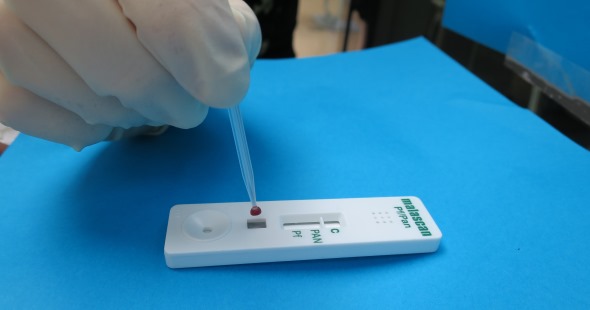Simplifying malaria blood testing

Malaria rapid diagnostic tests (RDTs) identify infection in blood taken from a fingerprick. However, transferring a blood sample from the patient’s finger to an RDT presents challenges from both a testing accuracy perspective (ensuring the right amount is being used) and a safety perspective (minimizing risks to the patient and exposure of healthcare workers to infected blood).
Most RDT kits are packaged with single-use disposable blood transfer devices (BTDs) that are used to collect, transfer and deposit a specified amount of sample blood – usually in the range of 5 to 50 µL – from a fingerprick to a sample well on the RDT cassette.
Considerable variation has been seen in the blood volume delivered by commercially available BTDs onto malaria RDTs. We teamed up with Injection 74 to develop and evaluate a new “inverted cup” device designed for easy transfer of 5 µL blood to malaria RDTs. Field studies conducted in Nigeria, the Philippines and Uganda, comparing our device with four commercially available BTDs, showed that the inverted cup achieved the highest overall performance in terms of accuracy of blood volume, blood safety, ease of use, and user preference.
The inverted cup BTD is now being used by more and more malaria RDT users and manufacturers, with an astonishing 250 million of them distributed in 2017. A major RDT manufacturer observed that “the inverted cup has been revolutionary in blood collection and has been accepted well by most customers.”
FIND and Injection 74 have now also developed a “conical cup” BTD for 23 µL of blood, for use with RDTs for other diseases including HIV and human African trypanosomiasis (HAT). Primary healthcare staff using the device for HAT RDTs in Uganda found the device to be easy to handle, making work faster, and increasing their confidence in front of the patient.
The designs of both BTDs are publicly available for adoption and the devices themselves can be ordered through Injection 74 (contact: bertrand.schutz@injection74.com). For any questions about the BTDs, please contact us.
This project was funded by the Australian government and UK aid from the British people.

